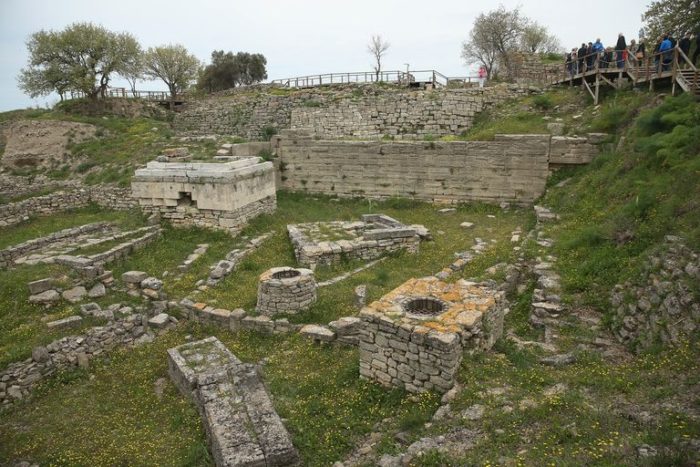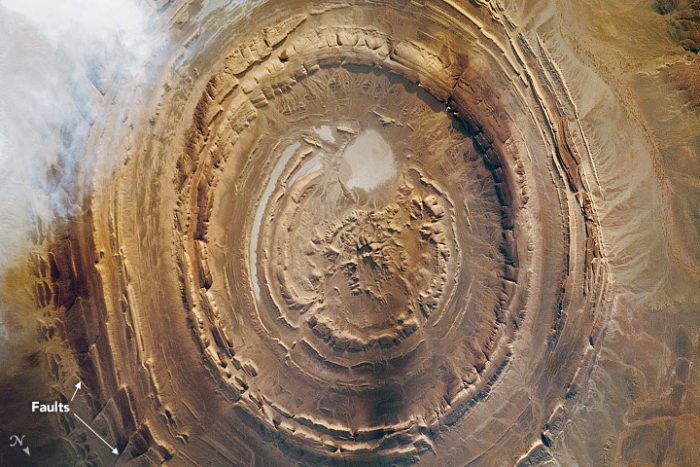Nov 27 2018
The Myths of Troy
 Last week I wrote about yet another claim for a possible location for Atlantis. This sparked some lively discussion, indicative of the fact that there is something alluring and iconic about the idea of Atlantis. I also think having a cool name is critical for such appeal (and not a small part of why Nostradamus, for example, is so iconic).
Last week I wrote about yet another claim for a possible location for Atlantis. This sparked some lively discussion, indicative of the fact that there is something alluring and iconic about the idea of Atlantis. I also think having a cool name is critical for such appeal (and not a small part of why Nostradamus, for example, is so iconic).
Long story short – there is no evidence that Atlantis existed, that Plato intended his writings to be an actual claim that Atlantis was real, and there is no evidence that the new supposed location, the Richat structure in Africa, is Atlantis or any ancient city.
In the comments, defenders of Atlantis made a claim, one that I have heard frequently before, that caught my interest.
One commenter wrote:
Atlantis a myth…?
Perhaps the story, but is the story based on something?Let’s remember Troy was a myth until rediscovered in 1870.
Another:
They laughed at Heinrich Schliemann, but he found Troy and started, for the most part, the science of archaeology.
and:
back in 19th centrury(sic): The consensus of actual scholarship is that Troy is a myth.
Thank you Heinrich Schliemann for not caring about consensus.
The initial response by me and others was – so what? The logic here is not valid. Just because one city written about in ancient texts turned out to be real, that doesn’t mean they all are, or that Atlantis specifically is. Further, the analogy is not a good one.

 The Pew Research Center has recently
The Pew Research Center has recently  Scientists
Scientists A video is making the rounds claiming “proof” that Atlantis existed in norther Africa.
A video is making the rounds claiming “proof” that Atlantis existed in norther Africa.  This is one of those items that at first does not seem like a big deal, and probably won’t get much play in the mainstream media, but is actually a significant milestone. Today, the international General Conference on Weights and Measures will meet in Versailles, France, to vote on whether or not to adopt a new standard for the kilogram. This is a formality, because this change has been worked on for years and the standard is now all set to change.
This is one of those items that at first does not seem like a big deal, and probably won’t get much play in the mainstream media, but is actually a significant milestone. Today, the international General Conference on Weights and Measures will meet in Versailles, France, to vote on whether or not to adopt a new standard for the kilogram. This is a formality, because this change has been worked on for years and the standard is now all set to change. It’s nice to get the occasional good news, to know that there are other people out there who respect facts and science. The Spanish government announced that it plans to
It’s nice to get the occasional good news, to know that there are other people out there who respect facts and science. The Spanish government announced that it plans to  There’s some bad news, followed by good news, but partially countered by further bad news. The bad news is that our population is growing, and therefore our food requirements, and yet we are approaching the limits of our ability to increase crop yield with cultivation alone. Experts can quibble about whether or not we are at or near the limit, but it’s pretty clear that we are not going to double crop efficiency in the next 50 years through cultivation.
There’s some bad news, followed by good news, but partially countered by further bad news. The bad news is that our population is growing, and therefore our food requirements, and yet we are approaching the limits of our ability to increase crop yield with cultivation alone. Experts can quibble about whether or not we are at or near the limit, but it’s pretty clear that we are not going to double crop efficiency in the next 50 years through cultivation. It’s pretty clear at this point that we need to be moving away from fossil fuels as quickly as possible. Fossil fuels essentially are stores of ancient carbon, long sequestered from the environment, that we are now releasing back into the environment, altering the balance of the carbon cycle leading to increased forcing of global temperatures.
It’s pretty clear at this point that we need to be moving away from fossil fuels as quickly as possible. Fossil fuels essentially are stores of ancient carbon, long sequestered from the environment, that we are now releasing back into the environment, altering the balance of the carbon cycle leading to increased forcing of global temperatures. Have you ever been in a semi-familiar location but couldn’t quite place where you were, then suddenly the landmarks line up and you know where you are? This might happen when entering a familiar location from an unusual direction, for example. Also (a seemingly unrelated question), when you visualize abstract ideas, do you arrange them physically. For example, do you visualize time (like days, weeks, months, years), and if so is there a particular physical relationship by which you mentally organize the progress of time?
Have you ever been in a semi-familiar location but couldn’t quite place where you were, then suddenly the landmarks line up and you know where you are? This might happen when entering a familiar location from an unusual direction, for example. Also (a seemingly unrelated question), when you visualize abstract ideas, do you arrange them physically. For example, do you visualize time (like days, weeks, months, years), and if so is there a particular physical relationship by which you mentally organize the progress of time? We are heading into cold and flu season, so
We are heading into cold and flu season, so 




